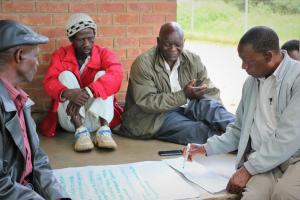Empowering communities to fight cholera misinformation in Malawi
Lilongwe – In the early months of 2023, village chief Dyson Chamizi and his brother were taken ill at Nathenje Health Centre, a facility near their home some 40 kilometres from Lilongwe, Malawi’s capital. Both had cholera, which is extremely virulent, but easily treatable.
Three days earlier, the pair had attended the funeral of a person who died of cholera. The burial was reportedly conducted without following preventive and safety measures to avert the spread of the disease.
“We did not have enough information on the risks that come with handling the body of a cholera patient or conducting a big funeral,” says Chamzi, explaining that rumours had been circulating that health workers were harvesting the body parts of patients who had died of cholera. As such they collected the deceased body from the hospital and carried out the burial according to custom.
As the cholera outbreak in Malawi spread in late 2022 and at the start of 2023, rumours and misinformation intensified. The rumour that health workers were harvesting and selling body parts was especially recurrent, sparking fear and anger among communities over burial rituals.
The outbreak that started in March 2022 is Malawi’s worst ever. Nearly 57 600 cases and over 1700 deaths have since been recorded. However, enhanced outbreak control measures have helped curb the outbreak, with the country reporting a downward trend in cholera cases and deaths since early February.
Misleading information on cholera poses a real threat to outbreaks control. Mistrust in health workers, fuelled by misinformation, has even sparked physical aggression towards doctors and nurses in cholera-affected areas, undermining outbreak response efforts.
To counter the dangerous rumours, World Health Organization (WHO) has collaborated with the Ministry of Health and partners to address the threat. The Organization has trained community health workers to debunk rumours and empower communities on cholera prevention. By mid-March, a total of 820 health surveillance assistants had been trained in Lilongwe, one of Malawi’s cholera hotspots. They work with community volunteers in an effort that has seen 658 018 households provide information about cholera, 10150 community meetings, 617 sessions held in schools, along with 985 gatherings in marketplaces to share accurate messages.
“Misinformation can be deadly as it fuels the spread of preventable diseases like cholera. We are engaging local leaders and influencers because they are the point of contact with communities,” says Tiyamike Chitete, one of the new health surveillance assistants.
“It is important to ensure that people are given the right information that will help them make informed decisions. When people are aware of how the disease is transmitted, it helps reduce the occurrence of cholera infections and deaths in communities,” she says.
Chitete lauds WHO’s intervention for broadening Malawi’s community engagement approaches and concepts. “We are now being strategic in our approach to build resilient communities to prevent outbreaks,” he says.
In early February, Malawi launched the End Cholera/Tithetse Kolera campaign, a strategy to intensify the response at community level. With support from WHO and partners, community health workers are conducting meetings with local leaders and community influencers to address cholera misinformation and mistrust in health authorities.
The aim is to avert a situation where misinformation and mistrust contribute to patients failing to seek timely treatment, raising their risk for rapid onset of severe dehydration, and even death. Left untreated, cholera can cause death within hours.
“Through community dialogues, we are assessing the public’s knowledge and perception of cholera, then tailoring our messages to address any misinformation or misconceptions,” says Aminata Kobie, a risk communication technical officer with the WHO in the African Region’s emergency team.
“This approach allows local leaders and community influencers to understand the risk factors for cholera in their respective areas and facilitates the dissemination of expert health advice,” she says.
As a result of these efforts, local leaders like village headman Chamizi have started engaging their communities to be proactive in the fight against cholera. “We now have by-laws to ensure everyone is being responsible and is following the recommended precautions to stop the spread of cholera, and limit deaths in our village,” he says.
WHO has deployed Risk Communication and Community Engagement (RCCE) emergency experts in high-burden districts, and has supported advocacy and dialogues with over 1075 local leaders in Lilongwe. These include chiefs, and religious and political leaders from various hotspot areas. During the sessions, leaders discuss local solutions to ending cholera in their communities, including making a commitment to the creation of enabling environments.
In his village, Chamizi is fully committed to keeping his community on high alert.
“I don’t want my people to die from a treatable and preventable disease like cholera. I believe knowledge is power and I am using every opportunity, at any community gathering, to address any misinformation and sensitize my people on cholera prevention and control measures. I will not stop until we kick cholera out,” he says.
Communications Officer
WHO Malawi
email: mukhunav [at] who.int (mukhunav[at]who[dot]int)
Tel: +265 999 375 094
Media Relations Officer
WHO Regional Office for Africa
Email: dalalm [at] who.int (dalalm[at]who[dot]int)
Tel: +254 703 245 761 (WhatsApp)



